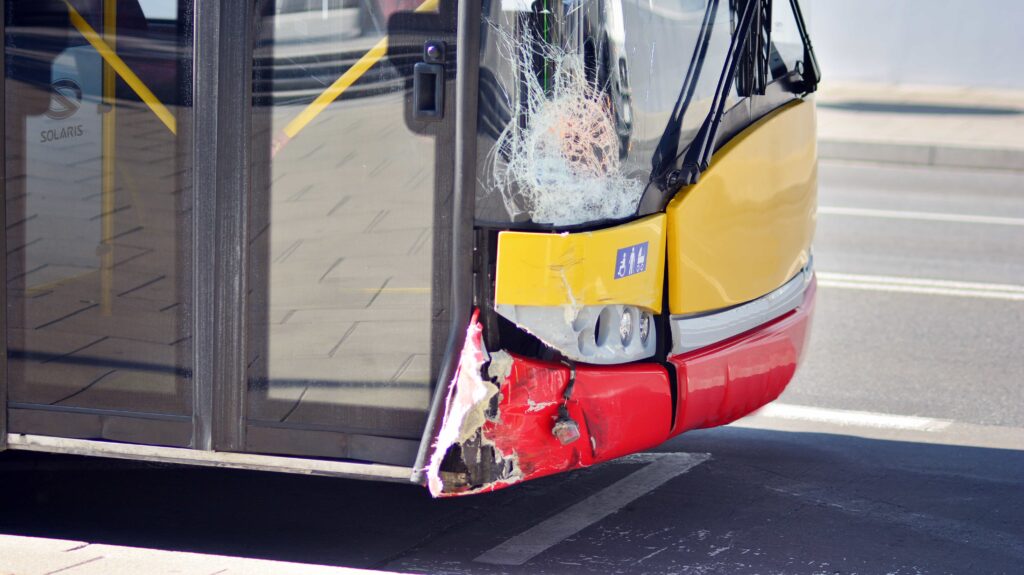After a charter bus accident in Chicago, your life might seem like it’s been turned upside down. Medical bills might be stacking up, and you may not know where to turn for help. At Abels & Annes, P.C., our Chicago charter bus accident lawyers understand the challenges you’re facing. We are here to offer compassionate legal guidance and fight for the compensation you need.
With years of experience in personal injury law and a proven track record of success, we are ready to stand by your side during this time. So no need to face this alone. Call us 24/7 for a free consultation.
Why Choose Abels & Annes, P.C. for Your Charter Bus Accident Case?

At Abels & Annes, P.C., we pride ourselves on providing exceptional legal services tailored to each client’s unique needs. Here’s why people trust us with their personal injury cases:
Proven Track Record of Winning Compensation
You don’t just need a lawyer; you need a legal team that gets results. Over the years, we’ve successfully secured millions of dollars for our clients. Whether it’s a $6 million settlement for a biking accident or $4.5 million for a premises liability case, our results speak volumes about our commitment to justice.
No Fee Unless You Win
We believe everyone deserves quality legal representation without financial barriers. That’s why we operate on a contingency fee basis. There are no upfront costs and no legal fees unless we recover compensation for you.
Available 24/7
Accidents don’t happen on a schedule, and your questions shouldn’t have to wait. Our team is available around the clock to take your call and give you the information you need.
Multilingual Services
At Abels & Annes, P.C., we proudly offer legal services in English, Spanish, and Polish. We strive to make our services accessible to Chicago’s diverse community because every injured individual deserves justice, no matter their language or background.
Award-Winning Attorneys
Our lawyers have been recognized among the best in the legal industry. With honors like being named to the Top 100 Lawyer List by Super Lawyers, a 10.0 Superb AVVO rating, and membership in prestigious organizations like the Million Dollar Advocates Forum, you can trust you’re in capable hands.
Commitment to Personal Attention
When you choose us, you’re not another case file. We treat every client like family. From the first call to the resolution of your case, we are here to answer your questions, keep you informed, and offer compassionate support throughout the process.
When you work with Abels & Annes, P.C., you can focus on your recovery while we handle the legal complexities.
What Causes Charter Bus Accidents?

While every accident is unique, several common factors contribute to charter bus accidents:
Driver Negligence
Bus drivers are responsible for ensuring the safety of passengers and others on the road. However, negligence such as speeding, distracted driving, fatigue, or impaired driving can lead to devastating collisions.
Improper Training or Certification
Driving a charter bus requires specialized skills and training. If a bus company hires drivers who lack the proper qualifications or fails to provide adequate training, the risk of accidents increases significantly.
Vehicle Maintenance Issues
Charter buses are large, complex vehicles that require regular inspections and maintenance to ensure proper functioning. Brake failures, tire blowouts, or other mechanical issues caused by poor maintenance can result in catastrophic accidents.
Reckless Driving by Other Vehicles
While a bus driver may be following all safety protocols, other drivers on the road might not. Reckless actions like unsafe lane changes or tailgating can lead to collisions involving charter buses.
Poor Road Conditions
Chicago winters, ongoing construction, and damaged roadways can make driving hazardous. Potholes, black ice, or improper signage can create dangerous situations for large buses.
Overcrowding and Overloading
If a charter bus exceeds its passenger or weight limits, the stability and handling of the vehicle can be compromised, increasing the likelihood of an accident.
Weather-Related Hazards
Adverse weather conditions, such as heavy rain, snow, or fog, can reduce visibility and make roads slippery. It’s the responsibility of the driver and bus company to adjust to these hazards accordingly.
Understanding the cause of a charter bus accident is key to building a strong legal case. Our team at Abels & Annes, P.C. will conduct a thorough investigation, collecting evidence, interviewing witnesses, and working with experts to determine exactly what happened and who is responsible.
What Are Some Common Types of Injuries in Chicago Charter Bus Accidents?

Because buses often lack the safety features found in passenger cars, like seat belts or airbags, passengers and others involved in collisions face a higher risk of injury. Below are some common types of injuries associated with these accidents:
Traumatic Brain Injuries (TBI)
A sudden impact or jolt to the head can cause a traumatic brain injury, ranging from concussions to severe brain damage. TBIs can result in cognitive impairment, memory loss, and permanent disability.
Spinal Cord Injuries
Damage to the spinal cord can lead to partial or complete paralysis, affecting a person’s mobility and quality of life. These injuries often require extensive medical treatment and rehabilitation.
Broken Bones
The force of a bus accident can easily result in fractures, including broken arms, legs, ribs, or even the pelvis. Recovery often involves surgery, physical therapy, and significant downtime.
Whiplash and Soft Tissue Injuries
Even a minor collision can cause neck and back injuries like whiplash or damage to muscles, ligaments, and tendons. These injuries may lead to chronic pain or mobility issues.
Internal Injuries
The impact of a crash can cause damage to internal organs, internal bleeding, or other life-threatening conditions that might not be immediately apparent. Prompt medical evaluation is crucial.
Cuts, Lacerations, and Bruising
Shattered glass, debris, or impact surfaces can cause severe cuts and lacerations. While external injuries may heal, some scars may be permanent, leaving emotional as well as physical reminders of the accident.
Psychological Trauma
It’s not just the physical injuries that victims of charter bus accidents endure. The emotional toll can include post-traumatic stress disorder (PTSD), anxiety, depression, or a fear of traveling again.
Fatal Injuries
Tragically, some charter bus accidents result in fatalities. Surviving family members may face financial hardship as well as emotional devastation and may be entitled to pursue a wrongful death claim.
Liability in Chicago Charter Bus Accidents

Determining liability in these kinds of accidents can be complex. Multiple parties may share responsibility, and figuring out who to hold accountable often requires a detailed investigation. At Abels & Annes, P.C., we are here to guide you through this complicated process with compassion and care, so you can focus on healing while we work to secure the compensation you deserve.
Who Can Be Held Liable in a Charter Bus Accident?
Liability in a charter bus accident depends on the unique circumstances of your case. Often, there are several entities that may be held accountable, from individuals to large companies. Here are the primary parties that could bear responsibility:
The Charter Bus Driver
Bus drivers hold a critical duty of care to transport passengers safely. If the driver’s actions, such as speeding, driving under the influence, texting while driving, or general negligence, contributed to the accident, they may be held responsible.
The Bus Company
Charter bus companies are responsible for hiring qualified drivers, maintaining their fleet, and ensuring the overall safety of their operations. If the company fails to properly vet its drivers, skips regular maintenance, or pressures drivers to stay on the road for unsafe durations, they can be held liable for their negligence.
Vehicle Maintenance Providers
Many charter bus companies outsource maintenance and repairs to third-party contractors. If a mechanical failure caused the accident, the maintenance crew or service provider responsible for inspecting and repairing the vehicle could be held accountable.
Bus or Vehicle Manufacturers
If a defect in the charter bus itself played a role in the accident—for example, a brake failure caused by faulty manufacturing or poor-quality parts—the manufacturer or distributor of the vehicle or its components could share liability.
Other Drivers
Sometimes, other motorists on the road may act recklessly, contributing to the bus accident. For example, a driver who cuts off a charter bus or causes a multi-vehicle pileup can bear responsibility for the crash.
Government Entities
Poor road conditions, inadequate signage, or improper road maintenance may play a part in an accident, especially in areas with heavy construction or extreme weather conditions like those commonly found in Chicago. When this happens, the city or state government responsible for maintaining the roads might be liable.
Third-Party Contractors
Some charter companies rely on third-party vendors for logistics, booking, or subcontracting. When these entities fail to follow safety protocols or enact policies that contribute to unsafe conditions, they may also be held accountable.
Shared or Comparative Liability
It’s important to note that Illinois follows a contributory negligence rule, which allows for shared liability among multiple parties, including, in rare cases, partial liability for the injured individuals. However, at Abels & Annes, P.C., we work tirelessly to protect our clients from unfair blame and pursue full justice on their behalf.
Why Determining Liability Requires a Lawyer
Establishing liability in a charter bus accident can be daunting for someone without legal experience. Multiple parties are often involved, and each will likely try to shift blame and protect their own interests. A skilled personal injury lawyer can thoroughly investigate your case, identify all parties responsible, and build a compelling argument to hold them accountable.
Here’s how we can help at Abels & Annes, P.C.:
- Investigating the Scene: Our team gathers evidence like accident reports, witness statements, and security camera footage to uncover the truth.
- Consulting Experts: We collaborate with accident reconstruction specialists and engineers to analyze mechanical or environmental causes of the crash.
- Navigating Complex Liability Chains: We dig into the relationships between bus companies, contractors, or third-party drivers to ensure no responsible party is overlooked.
- Fighting Insurance Companies: Large corporations often have teams of lawyers to minimize their liability. We have the experience to push back and fight for what you deserve.
At Abels & Annes, P.C., we believe in empowering our clients with the knowledge they need while taking the burden of legal complexities off their shoulders. You don’t need to face this alone. Contact us today for a free consultation, and remember, you owe nothing unless we win your case.
Charter Bus Accident Compensation You May Be Entitled To in Chicago

When you partner with our experienced personal injury team, we’ll work tirelessly to ensure that every avenue of compensation is explored. Here’s an overview of the types of damages you may be entitled to following a charter bus accident in Chicago.
Medical Expenses
Recovering from a serious accident can involve extensive medical care, from emergency treatment to long-term therapy. The cost of these services can add up quickly, leaving victims and their families struggling to keep up. You may be able to recover compensation for a wide range of medical expenses, including:
- Hospital bills, including ER visits and surgeries.
- Diagnostic tests like MRIs, X-rays, and CT scans.
- Prescription medications.
- Rehabilitation and physical therapy.
- Assistive devices such as wheelchairs or prosthetics.
- Ongoing or future care for chronic pain or permanent disability.
At Abels & Annes, P.C., we’ll consult with medical experts to estimate your current and future medical needs, ensuring that nothing is overlooked.
Lost Wages and Loss of Earning Capacity
Taking time off work to recover from your injuries often means a significant loss of income. If your ability to earn a living has been affected, you shouldn’t have to face financial uncertainty on top of everything else. Compensation for lost wages includes:
- Income you’ve already missed while recovering.
- Lost earning capacity if your injuries prevent you from returning to work or force you to take a lower-paying job.
We’ll gather pay stubs, tax returns, and expert statements to calculate how the accident has impacted your earning potential, both now and in the future.
Pain and Suffering
The physical pain and emotional anguish caused by a charter bus accident can change your life in profound ways. Compensation for pain and suffering goes beyond covering bills by addressing the intangible ways your injuries have affected your quality of life. This may include:
- Physical pain and limitations caused by your injuries.
- Emotional distress, including anxiety, depression, or PTSD.
- Loss of enjoyment of life, such as being unable to participate in activities you once loved.
These non-economic damages can be challenging to quantify, but our skilled attorneys understand how to present compelling evidence to maximize your compensation.
Property Damage
If your personal belongings, such as a vehicle, phone, or other valuables, were damaged or destroyed in the accident, you may be eligible for compensation to repair or replace them.
Disability and Disfigurement
Severe injuries can lead to life-long disabilities or scarring that alters your physical appearance and limits your abilities. Compensation for these devastating consequences takes into account the personal and practical effects on your daily life.
Loss of Consortium
For some, the aftermath of a charter bus accident extends beyond their own injuries. If your relationship with your spouse or family has been negatively affected, you may be entitled to damages for loss of consortium or companionship.
Wrongful Death Damages
If you’ve lost a loved one in a charter bus accident, no amount of money can fill the void, but a wrongful death claim can provide financial support during this incredibly difficult time. Compensation can cover:
- Funeral and burial expenses.
- Loss of financial support that the deceased would have provided.
- Emotional suffering for surviving family members.
Why You Need an Experienced Attorney
When you choose Abels & Annes, P.C., our team will:
- Carefully assess the full impact of your injuries, both financial and personal.
- Work with experts to assign a fair value to your damages.
- Negotiate aggressively with at-fault parties and their insurers to secure maximum compensation.
- Take your case to trial, if necessary, to fight for the justice you deserve.
Start Your Legal Journey with a Chicago Charter Bus Accident Lawyer Today
If you’ve been injured in a charter bus accident, don’t wait to protect your rights. Holding all responsible parties accountable and securing the compensation you’re entitled to can make all the difference as you move forward.
At Abels & Annes, P.C., we combine legal experience with heartfelt compassion to help you through this difficult time. Call us today for a free consultation, and remember, you pay nothing unless we win your case.